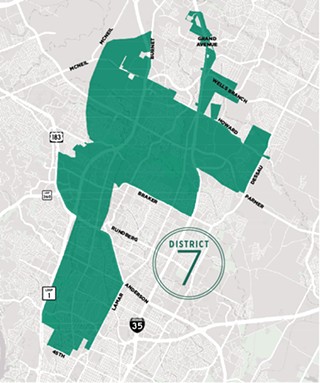Ten Districts, Many Visions
Candidates building the road to 10-1 work to define Austin's new civic order (Part II)
By Richard Whittaker, Fri., Oct. 3, 2014
District 7: Managing Growth
D7 Ballot Order
J.E. "Jeb" BoytZack Ingraham
Melissa Zone
Ed English
Darryl R. Wittle
Jimmy Paver
Leslie Pool
Pete A. Salazar Jr.
If one area of Austin is poised for development, it is District 7.
There is an almost unique confluence of circumstances and timing. In traditional, middle-class neighborhoods like Allandale and Crestview, the ranch-style bungalows built in the Fifties and Sixties are primed to become teardowns. A decade ago, Anderson Lane was dying; now it's a thriving shopping area, with businesses that have been priced off Lamar relocating there. The Domain rehabbed the old IBM campus, and other major employers have been attracted by the area's affordable commercial rents. Then there's Burnet Road, the single fastest-developing artery in Austin.
Yet it's a split district, divided by the constant traffic rumble on U.S. 183. The political reality is that the concerns of the generally more affluent "Lower Seven" have swallowed up far more political oxygen than those of the industrial "Upper Seven." It's not simply rich vs. poor. City Council candidate Jeb Boyt, an attorney and longtime civic activist, argues that the district can be divided into the Shoal Creek watershed around southern Burnet, and Walnut Creek around Parmer. In the former, the conflicts have been about increasing – or fighting off – density in established neighborhoods. In the latter, the development opportunities are all about infill rehab, with lots of old, single-story, light-industrial facilities, and even available green field sites.
Boyt's fear is that development debates get frozen in place, as everyone digs into ideological bunkers. He would much rather see that kind of energy redirected into finding consensus and positive solutions. He said, "There's all this concern about affordability – but if someone proposes a duplex, or tears down one house and proposes putting up two houses, even if it's a huge lot, it just falls into a fight and benefits no one."
Former legislative staffer Jimmy Paver echoes Boyt's ideas about Burnet north of 183, particularly around Howard Lane, as prime territory for planned development. However, he's a little tougher on the battles some Lower Seventh residents fight against increased density. "I'm not for rezoning an entire neighborhood," he said earlier in the campaign, "but if you have a granny flat or a duplex, that's not going to destroy the character of your neighborhood."
That places him somewhat at odds with Travis County staffer Leslie Pool, who argues that any development must "keep our neighborhoods intact." She wants those plans additionally solidified into concrete policy, arguing that the ongoing North Lamar/Burnet corridor study should be done "respecting the neighborhood plans." And she argues for an end to incentives for "companies that would move here anyway," mirroring the position of rival candidate, retiree Ed English. English still holds that even without incentives, the city should actively recruit businesses to move here as an economic driver, while Melissa Zone argues that cutting incentives can be a tool to proactively slow down growth.
For urban planner Zone, the problem is not density, but infrastructure. Developers build new utilities on their property, but it is bolted on to old, often crumbling water and sewage. "Then down the road, you have pipes burst. ... We can build as much housing as possible, but what if the infrastructure fails on you? People will leave." She voices frustration both at current council members who blithely encourage development, and city staff giving inadequate counsel. She said, "We're supposed to be a modern city, but we're planning in an antiquated fashion."
It's no secret that Austin's aging infrastructure is overstretched and underinvested. As a member of the city's 2012 Bond Advisory Committee, Boyt fears too little funding was approved for road maintenance. The recent drought has only exacerbated the problems, with Austin Water Utility crews stretched to a breaking point just dealing with fractured pipes. Zone describes those often undetected leaks also as an environmental issue, and argues that Austinites face tough decisions about fiscal priorities. "You need someone who's going to say the unpopular things. Do I want to build a library, or put in proper infrastructure? Well, I think you know where I'm going."
Got something to say on the subject? Send a letter to the editor.









